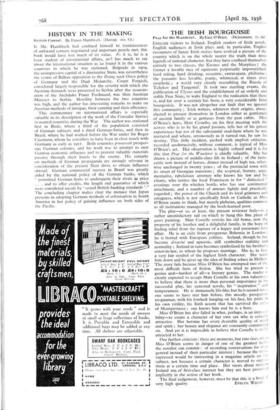HISTORY IN THE MAKING
British Consul. By Ernest Hambloch. (Harrap. los. Ed.)
IF Mx. Hambloch had confined himself to reminiscences of awkward corners negotiated and important people met, this book would have lost much of its value._ As it is, he is a keen student of international affairs, and has much to say about the international situation as he found it in the various countries in which he was stationed. Belgrade in 1909, the unimpressive capital of a diminutive State, was nevertheless the centre of Balkan opposition to the Drang nach Osten policy of Germany and the Dual Monarchy. Count Forgich, considered largely responsible for the severity with which the Austrian demands were presented to Serbia after the assassin- ation of the Archduke Franz Ferdinand, was then Austrian Minister to Serbia. Hostility between the two countries was high, and the author has interesting remarks to make on Austrian methods of intrigue, their cunning and their efficiency.
This commentary on international affairs is especially valuable in its description of the work of the Consular Service in neutral countries during the War. The author was stationed first in Basle, where a third of the population consisted of German subjects and a third German-Swiss, and then in Brazil, where he had worked before the War under Sir Roger Casement, whom he considers to have bcen in close touch with Germany as early as 1912. Both countries possessed prosper- ous German colonies, and his work was to attempt to oust German economic influence and to prevent valuable materials passing through their hands to the enemy. His remarks on methods of German propaganda are strongly relevant in consideration of the present Nazi drive to obtain influence abroad. German commercial success in Brazil was greatly aided by the national policy of the German banks, which 'permitted German firms to underquote their rivals in price . . . and to offer credits, the length and guarantee of which were considered unsafe by sound British banking standards '." The concluding chapter makes clear the menace that Japan presents in adopting German methods of colonisation in South America in her policy of gaining influence on both sides of the Pacific.


























































 Previous page
Previous page